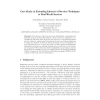Free Online Productivity Tools
i2Speak
i2Symbol
i2OCR
iTex2Img
iWeb2Print
iWeb2Shot
i2Type
iPdf2Split
iPdf2Merge
i2Bopomofo
i2Arabic
i2Style
i2Image
i2PDF
iLatex2Rtf
Sci2ools
111
click to vote
BPSC
2010
2010
Case Study on Extending Internet of Services Techniques to Real-World Services
: The Internet of Services promotes distributable, composable and tradeable services as first-class entities. Such services are assumed to encompass the full range from electronic web services to conventional business services. However, research and development of service models and platforms to realise the Internet of Services vision has largely been concentrating on pure technical services. In this case study, we have applied modelling and registration techniques to existing business services with none or few technical components. We outline the results of suitability and acceptance aspects and include an evaluation of the new Unified Service Description Language (USDL) compared to the Web Services Modelling Language (WSML) in the context of real-world service representation. 1 Background Businesses involved with e-business activities struggle to find a balance between keeping trade secrets and exposing information about their products and services on the untrusted Internet [DL02]...
Related Content
| Added | 13 Jan 2011 |
| Updated | 13 Jan 2011 |
| Type | Journal |
| Year | 2010 |
| Where | BPSC |
| Authors | Josef Spillner, Ronny Kursawe, Alexander Schill |
Comments (0)

